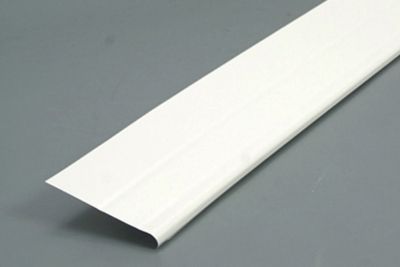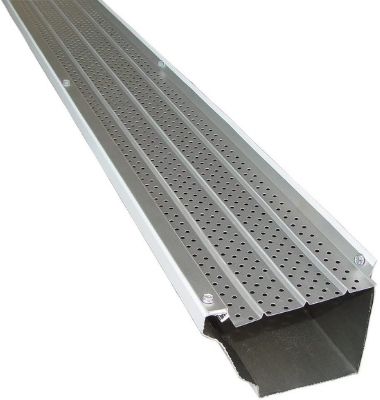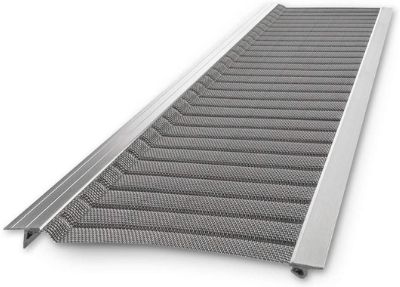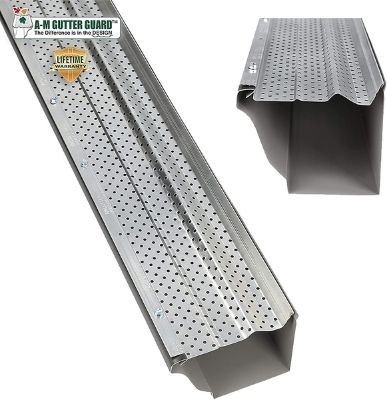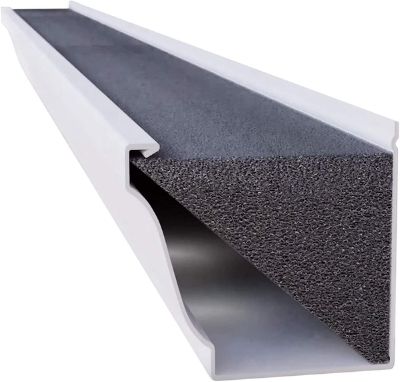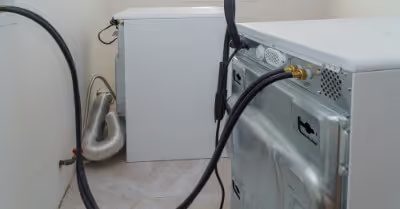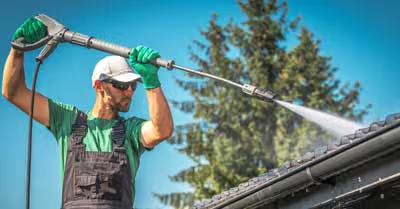Table of Contents
Top 5 Best Leaf Guard Gutters
A good gutter guard can help you out in several different ways and can reduce the amount of maintenance and cleanings you have to do while increasing the lifespan of your gutter system.
If a gutter gets blocked, the water can actually damage the exterior of your home and can rust the gutter which can limit their lifespan and functionality. Also, pests tend to gravitate towards stagnant water that pools up inside of clogged gutters that can be prevented with a good guard for the gutter. Finally, water can freeze inside unprotected gutters that can cause additional blockage or damage the gutter itself. But how do you know which gutter guards work well? Don’t worry, because I did the work for you!
Hallett Gutter Cover 60 ft
Picture of the Hallett Gutter Cover 60 ft
This gutter guard uses the power of surface tension to guide the water into the small opening and sliding debris over the edge. This gutter guard is made with durable and long lasting aluminum and comes with a 20 year warranty on the finish. It fits 5 and 6 inch gutters and has been tested for up to 5 inches of rainfall in a single hour. It costs $144 for 60 feet which comes to $2.40 per foot.
Pros
- Surface tension minimizes maintenance and cleaning
- Simple installation compared to other surface tension guard options
- Up to 5 inches of rainfall per hour
Cons
- Expensive compared to other options
- Noticeable from the curb
- Heavy
FlexxPoint 30 Year Gutter Cover System
This gutter guard cover uses small holes to allow water, but not debris into the gutter. It comes in a variety of color options as well as different options for how much you need for your gutter. This option is very affordable as long as you get more than 22 feet at once. It cost $84 for 102 feet or .$0.82 per foot. This gutter guard is great at protecting against large debris and may even flow it off of the gutter. However, it is not great for heavy rainfall or places that freeze frequently because the system lets droplets of water freeze on top.
Pros
- Affordable
- Color and length options
- Great for keeping out large leaves and other debris
Cons
- Not suitable for very heavy rainfall
- Not recommended for colder climates
- Seeds, sticks, and other small debris may find their way in
Raptor Stainless Steel Micro-Mesh Gutter Guard
Picture of the Raptor Stainless Steel Micro-Mesh Gutter Guard
This mesh gutter guard is made out of stainless steel and can withstand extreme temperatures and other harsh environments. It is easy to install and comes with a 25 year warranty. This product will keep even small debris out of your gutter. However, also due to the small holes, prolonged heavy rainfall may cause the water to spill over the edge. This leaf guard costs $114.90 for 48 feet, or $2.39 per foot.
Pros
- Keeps out large and small debris
- 25 year warranty
- Durable and long-lasting
Cons
- Not suitable for heavy rainfall
- Expensive compared to other options
- For 5 inch gutters only
A-M Aluminum Gutter Guard
This aluminum gutter guard is sturdy, but affordable. The holes are small, but with 380 of them per linear foot it can handle heavy rain as well. It is rust-proof and comes with a lifetime warranty. Finally, you can barely see it from the ground so it will not negatively affect your curb appeal. It cost $194.99 for 200 feet which comes to $0.97 per foot.
Pros
- Lifetime Warranty
- 380 holes per linear square foot so it can withstand heavy downpours
- Affordable
Cons
- Not great for very heavy debris buildup
- Does not work for some gutter styles
GutterStuff GSP-K5-8box-VC Foam Gutter Filter Insert
Generally, I do not like foam gutter guards, but this one works well and you have the option of buying ones that fit 4 or 5 inch gutters (the company makes other products for 6 inch gutters as well). This gutter guard lasts longer than most foam style options and even comes with a 15 year warranty. It also lets more water in than some products. It costs $82.89 for 32 feet or $2.59 per foot.
Pros
- 15 Year Warranty
- Easy Installation
- Suitable for heavy rainfall
Cons
- Expensive compared to other foam gutter guards
- No 6 inch gutter option
- Likely needs occasionally cleaning
Leaf Guard Gutter Buying Guide
When shopping for a leaf guard gutter system, it is good to know the different styles and materials that you can choose from. It is also important that you know how to measure your gutter so that you purchase one that fits.
Types of Gutter Guards
- Surface Tension Gutter Guards - Surface tension gutter guards, also known as reverse curve gutter guards, are my personal favorite type because they force debris to fall to the ground. This means that I do not have to clean them very often at all. However, many options are expensive or difficult to install because they insert below the shingles on the roof.
- Screen gutter Guards - Screen gutter guards have small holes and fit at the top of your existing gutters. They are usually an affordable, yet effective way to keep out large debris. However, smaller pieces of debris may still find their way into your gutter system.
- Micro Mesh Gutter Guards - Micro mesh guards are similar to screen gutter, but they have smaller holes that do not allow small debris in. Additionally, they often have more holes that allow a greater amount of water into the gutter to prevent the system from flooding. They are usually much more expensive than standard screen gutter guards.
- Foam Gutter Guards - These are foam pieces that fit inside of the gutter and are usually very affordable. However, they can trap moisture and debris inside of them. They work pretty well for letting water, but not large debris into the gutter. However, in my experience they seem to either block too much water or let some debris in.
- Brush Gutter Guards - These gutter guards look like brushes and fit into the gutter. The bristles prevent debris from getting into your gutter. These are my least favorite type of gutter guard and I find that they clog easily and are generally not very effective.
Materials
Leaf gutter guards are made out of a variety of different materials. In addition to the foam substance that makes up the foam gutter guards and synthetic substances and wire that the brush gutter guards are made of, you have a few different options.
Vinyl is a very affordable material for leaf guards, but will not last as long as other materials. Harsh conditions will make it deteriorate and become brittle fairly quickly.
A lot of high quality leaf guards are made out of aluminum because it is lightweight and durable. Not only that, but it is easy to get aluminum in a variety of different colors. Aluminum is rust proof and since we are talking about gutters, that is very important for the lifespan of your gutter guard system.
A lot of gutter guards are also made out of stainless steel because it is resistant to corrosion and durable. Other options use galvanized steel. Steel options are a good choice for those who live in very hot or very cold climates.
A less common material for gutter guards is copper. Copper has a different aesthetic appeal than other options and some traditional homes have copper gutters that will match. This is possibly the longest lasting material for gutters and gutter guards alike.
Measure Your Gutter
Gutter guards usually come in 4, 5, or 6 inch varieties for the size of your gutter. To measure your gutter, measure from the top outside edge to the opposite outside edge. The most common size is 5 inch.
Contractor or DIY
Contractors will put up gutter guards for you, but it will cost between $10 and $20 per linear foot. Some gutter guards are best for contractors or professionals to install, but most are pretty simple for you to do as well. Surface tension gutter guards are usually the most difficult to install and you should also hire a professional to install any gutter guards that are higher than first floor level.
Warranty
It is important to take warranty into consideration because a lot of gutter guards have warranty and you also want to make sure that the installation of the gutter guard system does not void the warranty on the roof itself. Usually a roof will have a warranty longer than 20 years and it is common for warranties to last 50 or more years. A gutter guard system that fits underneath the shingles may very well void the warranty on your roof.
Some types of leaf guard gutters do not typically have warranties because they are not designed to be a permanent solution. These types include foam and brush guards. Micro mesh guards and surface tension guards will usually have the longest warranties and can be installed professionally as well.
Gutter Guard Maintenance
Regular maintenance will keep your gutter guard functional for much longer than if you just leave it. A gutter guard will almost certainly significantly reduce your gutter cleaning frequency. However, this does not mean that you will never have to clean it out. I usually do not have to clean mine except on the corner of the house where I have a large tree, but this also depends on the climate that you live in.
A gutter guard system can also develop blockage over time if it is neglected. This is the reason I prefer surface tension options because they attempt to flow debris off of the roof. However, micro mesh options are also good, but regardless of the type that you choose, you will have to make sure that debris does not build up.
Additionally, gutter guards can weaken or even deteriorate over time. This is normal and you may have to replace the entire system. However, you may just have sections of the gutter guard that require replacement while the remainder of the system is still functional. Regular cleaning can reduce the amount of natural wear and tear that your gutter guard system suffers.
Heavy Rain
Some gutter guards are not designed for heavy rain, especially heavy rain that lasts for over an hour. Foam gutter guards are not good for heavy rain because they typically do not allow enough water through to prevent the gutter from overflowing. The best option for areas that get significant rainfall are options that use surface tension because they will flow debris away while also allowing a lot of water in.
Recent Articles



